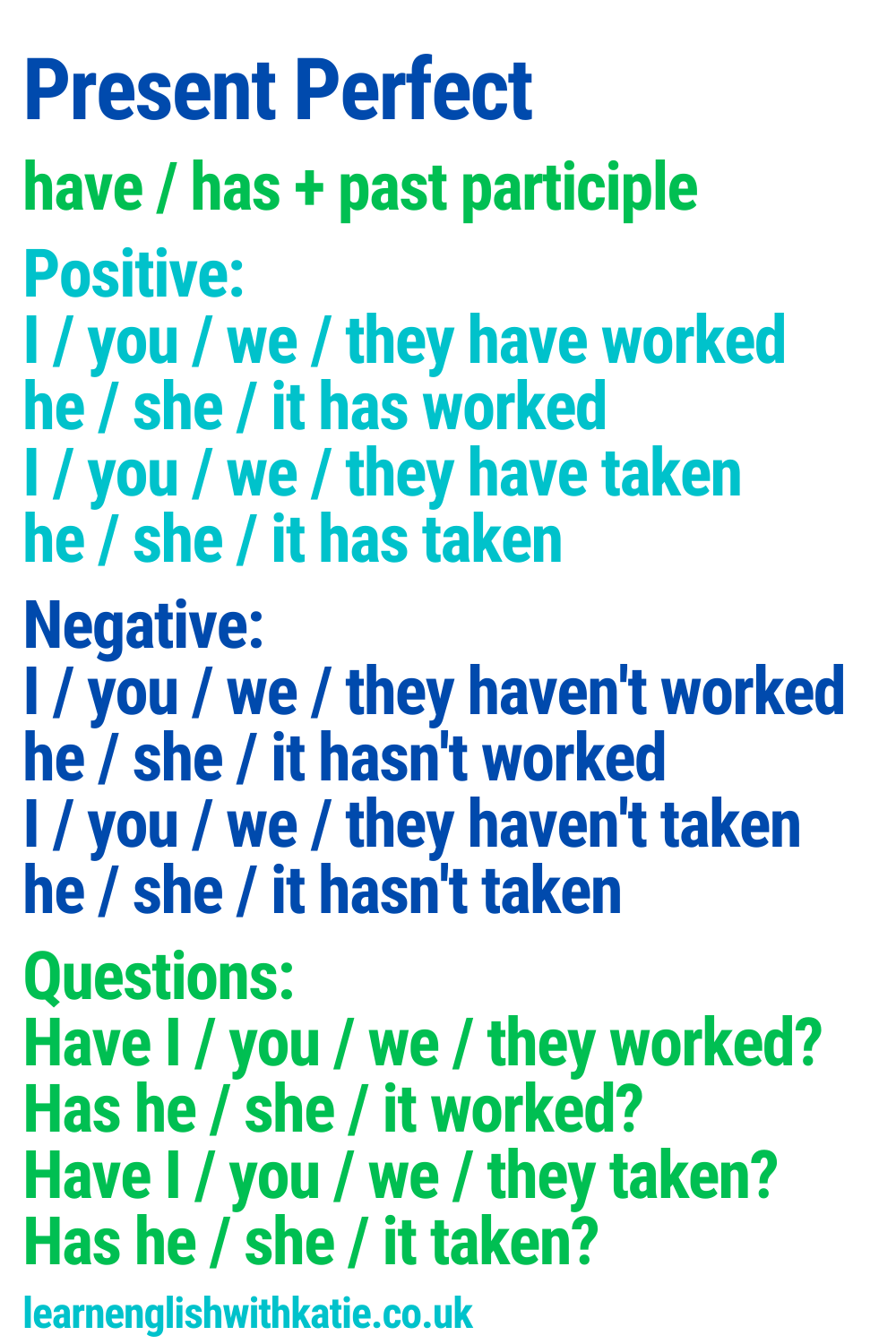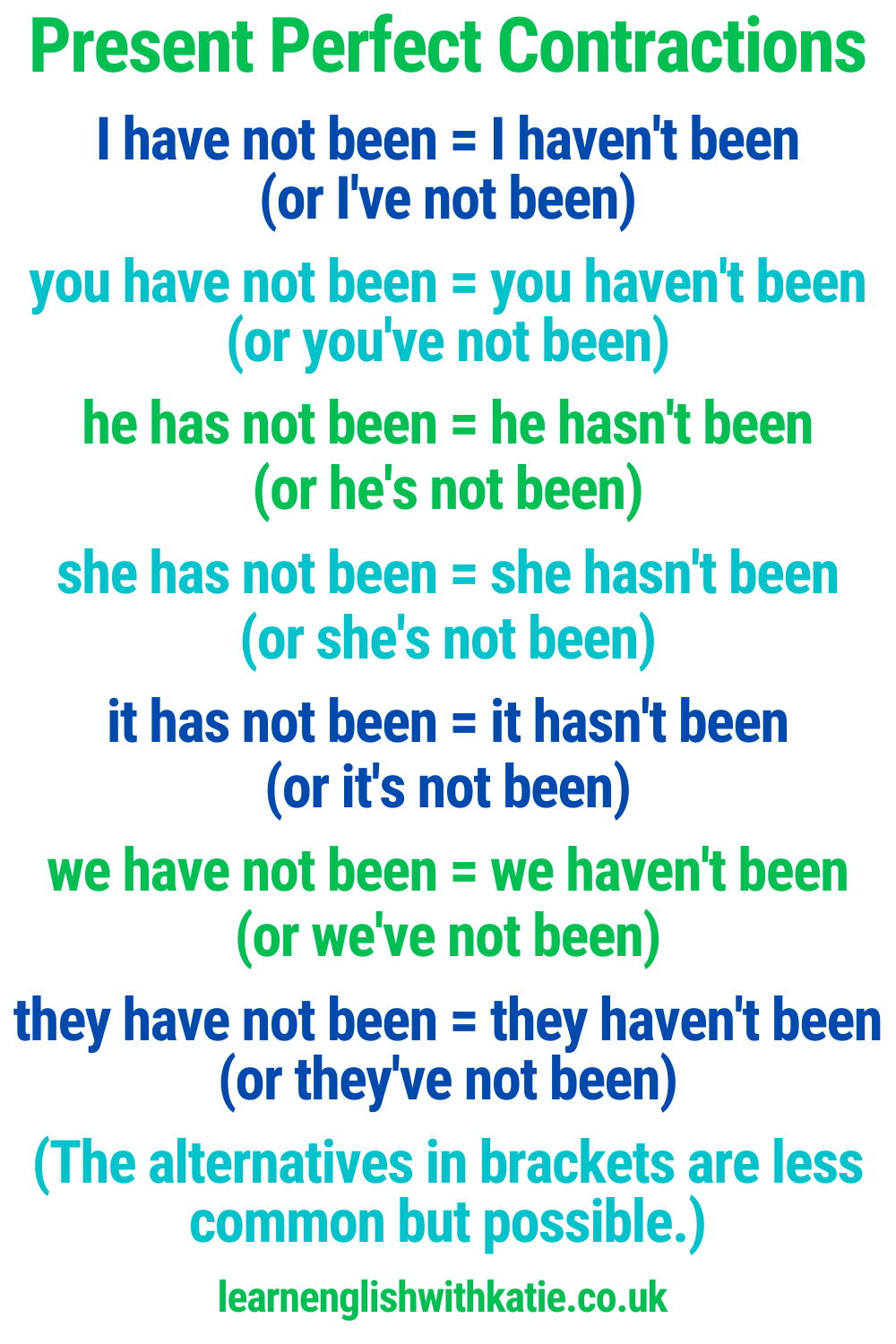|
This is one of the most problematic tenses in English. Basically, it is used when there is some connection between the past and the present. Something happened in the past and is relevant now or it started in the past and is still true now. Keep reading to learn more. It’s also important to note that there are differences between British and American English. Americans use the present perfect slightly less than we do in Britain. I’m English so I’ll mainly explain how we use it in the UK but I’ll mention American English where I know it’s different. The British way is acceptable in America and even considered to be more correct by some people so you can’t go wrong with learning the British use of the present perfect! The present perfect is sometimes called present perfect simple. It’s the same thing. “Simple” means “not continuous”. Formation present perfect = have / has + past participle (The past participle is the -ed form for regular verbs or the third form in the irregular verb table.) Positive: Be: I / you / we / they have been, he / she / it has been (Or: I’ve / you’ve / we’ve / they’ve been, he’s / she’s / it’s been) Work: I / you / we / they have worked, he / she / it has worked Take: I / you / we / they have taken, he / she / it has taken Negative: Be: I / you / we / they have not been, he / she / it has not been (I / you / we / they haven’t been, he / she / it hasn’t been) Work: I / you / we / they have not worked, he / she / it has not worked Take: I / you / we / they have not taken, he / she / it has not taken Questions: Be: Have I / you / we / they been? Has he / she / it been? Work: Have I / you / we / they worked? Has he / she / it worked? Take: Have I / you / we / they taken? Has he / she / it taken? Spelling for -ed endings If a verb ends in -e, just add -d: dance → danced agree → agreed tie → tied Double the consonant: The past participle for regular verbs is the -ed form. If a verb has one vowel and one consonant at the end, we double the consonant. This only works if the vowel is short and there is one syllable. For example: hug → hugged stop → stopped Don’t double if the verb ends in -w or -x (snow → snowed, fix → fixed) or if there are two vowels (wait → waited) or if there are two consonants (help → helped) If there are two syllables it usually depends on the word stress. If the stress is on the first syllable, don’t double the consonant: offer → offered listen → listened If the stress is on the second syllable, double the consonant: prefer → preferred regret → regretted There are some exceptions: In British English, we write “travelled” but Americans write “traveled”. Most other verbs ending in -l work the same way. “Focused” and “focussed” are both possible, although the first spelling is more common. kidnap → kidnapped Verbs that end in -c: panic → panicked Change -y to -ied: try → tried study → studied Except when there is a vowel, -ay, -ey and -oy: play → played enjoy → enjoyed For irregular verbs, the past participle is the third form and you have to learn these. Use 1. Actions and situations which started in the past and are still true now: I've lived in this house since I was a child. They’ve been married for five years. (Often with “for” or “since”.) 2. Life experiences (at no specific time): I’ve read “The Lord of the Rings”. I’ve been to Japan but I’ve never been to China. Have you ever seen “Titanic”? She’s written three books so far. (Often with words like “ever”, “never” and “so far”. Only use present perfect if the person is still alive. We are talking about what a person has done so far. If the person is dead, use the past simple.) 3. When the time period isn’t finished: I’ve been on the phone a lot this morning. (It’s still morning.) She’s read three books this month. (This month isn’t finished yet.) I haven’t had a holiday this year. (This year isn’t finished yet.) (If the time period is finished, like “yesterday” or “last year”, we use the past simple.) 4. Past actions with a present result: I've cut my finger. (Present result = now she is bleeding) She’s lost her glasses. (Present result = now she can’t find them) 5. News and recent events: The Prime Minister has announced plans for a new high-speed railway. They’ve just had a baby! Have you seen any good films recently? The present perfect is often used with words like “yet”, “just”, “already” and “recently”. (In American English, it is fairly common to use the past simple here but the present perfect is more common in Britain.) Be careful. It's NOT true to say that present perfect means recent. You can see from points 1 and 2 that this structure can refer to a long time ago. Common mistakes 1. She have finished her homework. ❌ She has finished her homework. ✔️ Don’t forget to use “has” for he, she or it. 2. I’ve wrote him an email. ❌ I’ve written him an email. ✔️ Make sure you use past participle (the third form, not the second). 3. She’s putted everything away. ❌ She’s put everything away. ✔️ “Put” is an irregular verb and the past participle is the same as the infinitive. Make sure you learn which verbs are irregular. 4. He has never gone to Paris. ❌ He has never been to Paris. ✔️ “He has gone” and “he has been” have a different meaning. “He has gone to Paris” means he is still in Paris. “He has been to Paris” means he went some time in the past but he isn’t there now. 5. I live / I’m living in Cambridge since 2002. ❌ I’ve lived in Cambridge since 2002. ✔️ Use the present perfect, not the present simple. 6. I have phoned him last night. ❌ I phoned him last night. ✔️ If we say when it happened, we should use the past simple. Wondering what to study next? You might like to try the present perfect continuous. If you would like more lessons and tips for how to learn English, click the button below and sign up for my newsletters:
0 Comments
Your comment will be posted after it is approved.
Leave a Reply. |
About the blogFollow the blog for mini lessons and tips on how to improve your English. Categories
All
Archives
July 2024
|



 RSS Feed
RSS Feed
